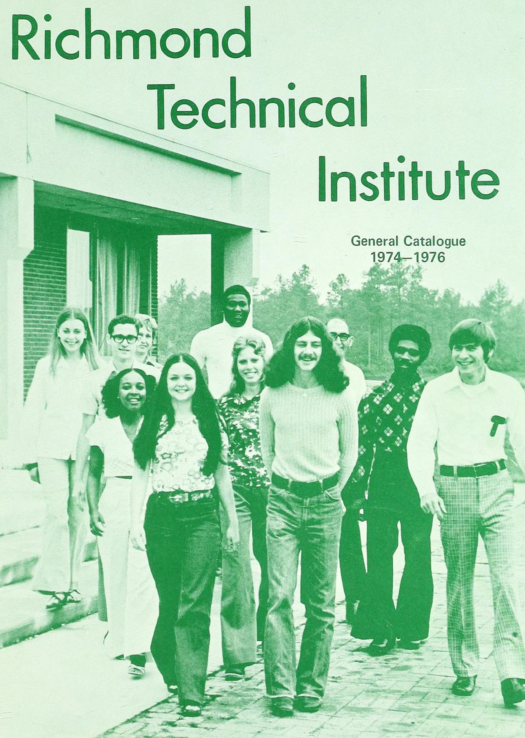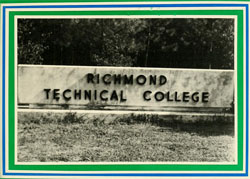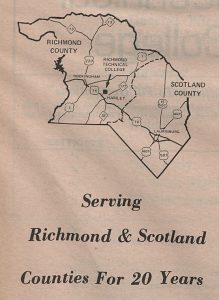 Two new scanned documents from Richmond Community College are now available on DigitalNC. These newly digitized documents are a 1984 newsletter to celebrate the 20th Anniversary of the college, and the 1985 Spring Quarter Schedule for the school, at the time named Richmond Technical College.
Two new scanned documents from Richmond Community College are now available on DigitalNC. These newly digitized documents are a 1984 newsletter to celebrate the 20th Anniversary of the college, and the 1985 Spring Quarter Schedule for the school, at the time named Richmond Technical College.
The 1984 booklet celebrated the 20th anniversary of Richmond Technical College. In April 1984, a four-day-long Open House was held at the RTC campus, with entertainment, displays from local businesses and industries, demonstrations of RTC’s computer systems, and North Carolina Governor Robert Scott speaking as president of the NC Community College System. It also acted as an informational booklet, including which classes would be offered the following year, which degrees and curricula were offered at the school at the time, and new equipment the campus had received.
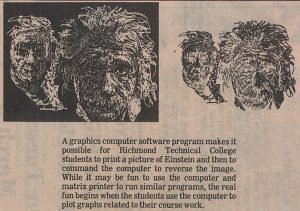
The 1985 Spring schedule also contained news and information on campus activities, tuition, and dates and times for classes. One of the programs they advertised was their computer-aided graphic design curriculum, where students could “print a picture of Einstein”, then “command the computer to reverse the image.” (see right) At the time, it cost a resident of North Carolina $51 for a full-time student’s tuition.
To learn more information about Richmond Community College, visit their partner page, or take a look at their website.
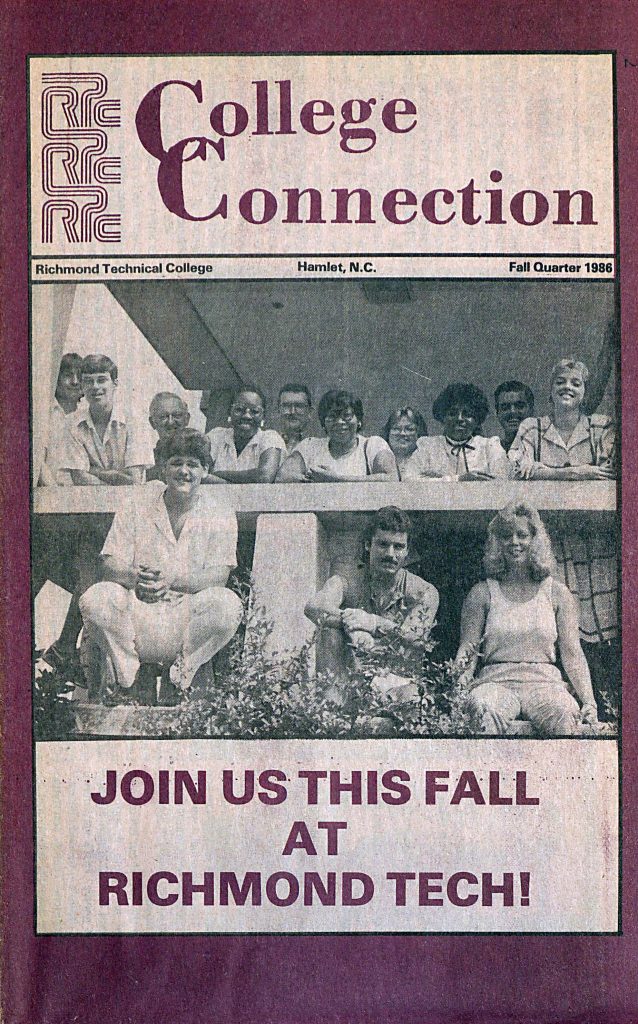
Cover of the Fall 1986 College Connection.
We are one of 29 finalists for the Institute of Museum and Library Services 2018 National Medal for Museum and Library Service. Now through April 13, IMLS is asking the people who have been impacted by the Digital Heritage Center to share their stories. If you have a story you’d like to share, we’d love to hear from you! Please contact us or share via social media by tagging us on Facebook (@NC Digital Heritage Center) or on Twitter (@ncdhc).
Today’s story comes from Carolyn Bittle, Dean of Learning Resources at Richmond Community College in Hamlet. We have worked with RCC to digitize their yearbooks and other campus publications. Carolyn’s story is an example of digitization of print resources garnering attention and renewing interest in the college’s history.
I can say that since Richmond has been able to get some of our archival material digitized and online, it has increased interest from our administration.
As a result of getting our older copies of the College Connection online, with your help, we are in the progress of “ rebirthing” the College Connection [as RCC Connect]. The publication stopped in the spring of 2009, and now we are working on bringing it back into publication. Hopefully, this will be available mid-March. The success stories, and class offerings were favored during its early printings, and it reached a lot of people in our two county area.
So thank you for helping to get our publication back up!
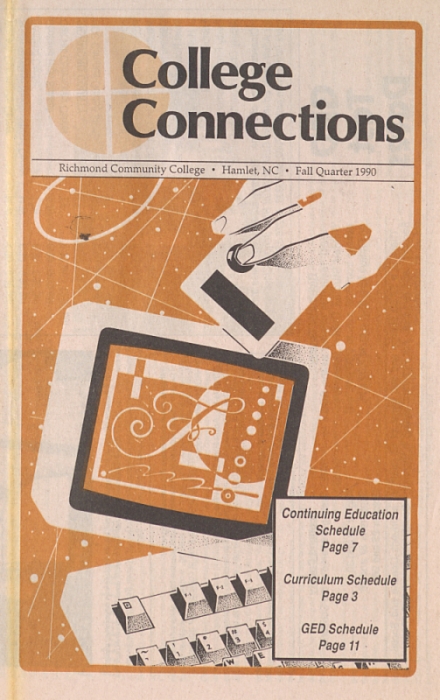
Fall quarter 1990 course catalog
Richmond Community College course catalogs from 1984-2009 are now up on DigitalNC. These catalogs were published four times a year and include descriptions and schedules for degree and certification focused courses, as well as continuing education classes in a variety of subjects. The catalogs also contain articles focusing on students and faculty members from Richmond Community college.
In this collection, it’s interesting to look at the trends in course offerings from 1984-2009. One can see drastic changes in the role of computer technology in Richmond Community College’s curriculum by comparing the DOS and word processing classes offered in the late 1980s, to the fully online classes and programs offered in the 2000s. One can also see changing recreation trends with continuing education classes in tailoring, flower arranging, and basket weaving being offered in the 1980s, and classes like digital photography, mixology, and sign language being offered in addition to more traditional craft classes in the 2008 catalogs.
Take a look at the new and previously added Richmond Community College catalogs by clicking here.
To learn more about Richmond Community College, take a look at their partner page, or visit their website.

You may be surprised to learn what was worrying the citizens of Chapel Hill and Carrboro in 1958. Our most recent additions from the Chapel Hill News Leader, supplied by our partner, the Chapel Hill Historical Society, touch on everything from the University of North Carolina at Chapel Hill, civil rights, alcohol laws, and policing to some new technologies arriving the city.
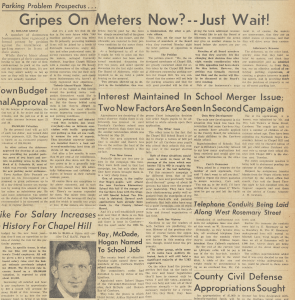
July 31, 1958
One of the first big stories breaks about midway through the year: the parking meter debacle. Apparently, the Chapel Hill Board of Aldermen had been tossing around the idea of installing parking meters for a couple of years, and the decision to finally do it happened in 1958. Local businessmen immediately pushed back, arguing that instituting paid parking would hurt their businesses.
Apparently, everyone could agree on the fact that the parking meters were ugly, but the author of the article, Roland Giduz, speculated that complaints about the meters would die down once everyone realized how much they improve traffic (spoiler alert: that doesn’t really happen based on the coverage that follows).
Just below the meter gripes article is another big story of the year: school integration. It describes two issues for an upcoming school merger election: first, whether Black students would attend Carrboro Elementary School, and second, whether the Chapel Hill School Board would charge $30 tuition for students from Carrboro. (Note: more materials about Carrboro Elementary School were also uploaded in this batch, including architectural plans and a document of education specifications).
The earlier articles that this one refers to (from May 22, 1958) don’t mention race until the very last line: “As to the general pupil assignment policy for next year, [Mr. Culbreth] said that he anticipated that the Board would re-adopt the existing regulations, whereby racial segregation has been maintained.” As the July article notes, this is four years after the Brown v. Board Supreme Court decision declaring racial segregation in public schools unconstitutional.
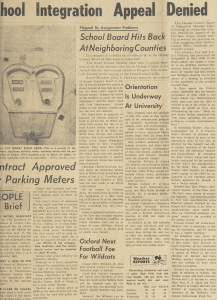
September 11, 1958
The issue gets a more personal focus in the September 11, 1958 issue, when the Orange County School Board denied Lee and Lattice Vickers’ child admittance to the then all-white Carrboro Elementary School. The Vickers’ case was set against the backdrop of ongoing school assignment problems, with neighboring school systems fighting each other over pupil placement and resources.
The fight to racially integrate schools in Chapel Hill (and throughout North Carolina) continued well into the 1960s, and, sadly, none of the community papers that we have from the area extend past 1963. One of the latest articles available, from The Chapel Hill Weekly, reports a survey of Southern business leaders and how their perspective on industry shaped their views on the matter.
But, in 1958, public school integration was still competing for front page space with—you guessed it—parking meters.
Another major debate in the community during this time was over the sale of alcohol. North Carolina was ahead of the curve of prohibition, outlawing the sale and manufacture of alcohol in 1909 (a decade before the national amendment). And, even after the repeal of prohibition in 1933, the Alcoholic Beverage Control system wasn’t created until 1937. (Graham County remained a “dry” county until just recently). In 1958, there was still a lot of resistance to the ABC setting up shop.

November 17, 1958
In this case, efforts were headed by a citizens group concerned about the effects of the ABC stores in the area. Meetings were held at the University Baptist Church, though Carolyn Noell, a spokesperson for the group, noted that local churches were only providing contacts and spaces (not serving as official sponsors).
Not long before this, the News Leader reprinted an article from the Durham Morning Herald about how lucrative the ABC stores were. Apparently, the Durham ABC stores sold almost $58 million of alcohol from June 30, 1957, to September 1958 (enough to pay for Durham’s entire share of the Raleigh-Durham airport, plus some for Lincoln Hospital, local schools, warehouse equipment, public libraries, garbage disposal services, and a rabies inspection program, among other things). To put these sales into proportion, a fifth of whiskey (from a “popular brand”) cost $3.95 back then. Certainly, money was at the heart of the argument for the Orange County Citizens for Legal Control in their ad in the January 29, 1959 issue.
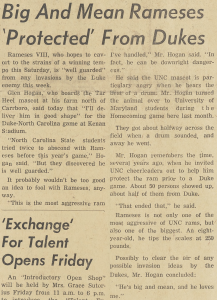 Of course, in a college town like Chapel Hill, there’s also frequent news about the University. One article, from October 2, 1958, warned that student enrollment may swell to between 12,000 and 14,000 in 1970 (today, total enrollment exceeds 30,000). And—surprise!—much of the concern about the growing student population is related to parking.
Of course, in a college town like Chapel Hill, there’s also frequent news about the University. One article, from October 2, 1958, warned that student enrollment may swell to between 12,000 and 14,000 in 1970 (today, total enrollment exceeds 30,000). And—surprise!—much of the concern about the growing student population is related to parking.
One of the funnier articles about UNC-CH is about Rameses, the live mascot (not to be confused with costumed cheerleader Rameses, former bodybuilder). Rameses VIII, then in power, was “the most aggressive ram I’ve handled,” according to Glen Hogan, his boarder. He was also one of the biggest up until then, clocking in at 250 pounds. These two facts, Hogan hoped, would dissuade rival Duke students from stealing the mascot.
The reigning Rameses (né Otis) ascended in 2020 as the twenty-second mascot. His handler, James Hogan, is part of the same family that has been caring for the mascots since the 1920s. Rameses XXII has “come a long way” in getting used to people and is (presumably) a bit sweeter than his “big and mean” predecessor—though he is still well-guarded.
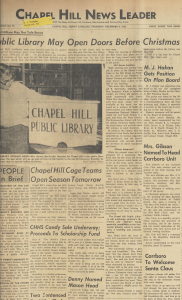
December 4, 1958
One final story from 1958 is the opening of the Chapel Hill Public Library, which was originally opened in the Hill House on West Franklin Street. The goal, according to Mrs. Richmond Bond, chairman of the board, was to “supplement” the University’s library by focusing on children’s and popular books that were generally unavailable at UNC.
Bond argued that Chapel Hill was the only town of its size in North Carolina without a public library and that the University library had “almost more than it can do” with the increase of UNC students. This led the Board of Aldermen to approve a $4,600 grant for the local library. Somebody even donated over 300 books before the library opened its doors.
In the very last uploaded issue of the Chapel Hill News Leader, from January 29, 1959, the top headline reads, “Death of a Newspaper.” Due to internal litigation, the paper had to stop running.
You can see all of our issues of the Chapel Hill News Leader here and more materials from the Chapel Hill Historical Society on their partner page. You can also visit their website for more information.
 Two new scanned documents from Richmond Community College are now available on DigitalNC. These newly digitized documents are a 1984 newsletter to celebrate the 20th Anniversary of the college, and the 1985 Spring Quarter Schedule for the school, at the time named Richmond Technical College.
Two new scanned documents from Richmond Community College are now available on DigitalNC. These newly digitized documents are a 1984 newsletter to celebrate the 20th Anniversary of the college, and the 1985 Spring Quarter Schedule for the school, at the time named Richmond Technical College.


